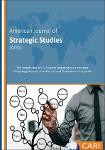| dc.contributor.author | Ogwang, Okello Godfrey | |
| dc.contributor.author | Obici, Gilbert | |
| dc.contributor.author | Mwesigwa, David | |
| dc.date.accessioned | 2023-02-06T12:09:44Z | |
| dc.date.available | 2023-02-06T12:09:44Z | |
| dc.date.issued | 2023 | |
| dc.identifier.citation | Ogwang, O. G., Obici, G. O., & Mwesigwa, D. M. (2023). The contribution of Civil Society Organizations in pro-poor budgeting processes: A review on Local Governments in Uganda. American Journal Of Strategic Studies, 5(1), 1-16. | en_US |
| dc.identifier.issn | 2790-6191 | |
| dc.identifier.uri | http://ir.lirauni.ac.ug/xmlui/handle/123456789/488 | |
| dc.description.abstract | Purpose: This study aimed to analyse the contribution of CSOs in pro-poor local government budget processes, with Dokolo District as a case study. The study addressed four questions, namely; (i) what is the extent to which CSOs contribute to local government revenue enhancement? (ii) What is the magnitude to which CSOs influence the enactment of pro-poor local government budget allocations/priorities? (iii) to what extent do CSOs promote pro-poor implementation of enacted local government budgets? And (iv) to what extent do CSOs prevent leakages to local government budget resources?
Methodology: The study adopted a review of secondary literature gotten from journals, documentaries, periodicals, annual reports and statistical analyses
Findings of the study: The findings suggest that CSOs contribute to local government revenue enhancement, building the capacity of local governments in revenue mobilization, providing off-budget and on-budget support to local governments; that CSOs promote pro-poor local government budget allocations through forums such as budget conferences and budget dialogues; that CSOs influence local governments to implement their budgets in ways that serve the best interests of the poor and/or the underprivileged and/or their priorities; by pressurizing local governments to implement pro-poor priorities that local governments would otherwise not implement and by speeding up or reducing delay in the implementation of pro-poor priorities or projects; and that CSOs promote pro-poor local government budgets by preventing leakages to pro-poor local government resources by among others checking shoddy work in pro-poor projects.
Recommendations: From the findings, it is encouraged that local governments should leverage CSOs as an important resource in enhancing their revenue; that local governments should involve CSOs in all phases of the budget circle; that local governments should embrace the use of social accountability forums and tools such as barazas, Public Expenditure Tracking Surveys (PETS) and social movements for checking local government budget resource leakages to enhance decentralized service delivery.
Unique contribution to policy and/or practice: The results of this study are relevant to practitioners of civil society organisations seeing that the level of corruption in governments as well as the magnitude to which vulnerable sections continue to be marginalised is growing hence the need for the civil society to offer checks and balances in budget processes.
Keywords: Civil society organizations, pro-poor budget processes, local government, Dokolo | en_US |
| dc.language.iso | en | en_US |
| dc.publisher | American Journal of Strategic Studies | en_US |
| dc.subject | Civil society organizations, pro-poor budget processes, local government, Dokolo | en_US |
| dc.title | The contribution of Civil Society Organizations in pro-poor budgeting processes: A review on Local Governments in Uganda | en_US |
| dc.type | Article | en_US |

